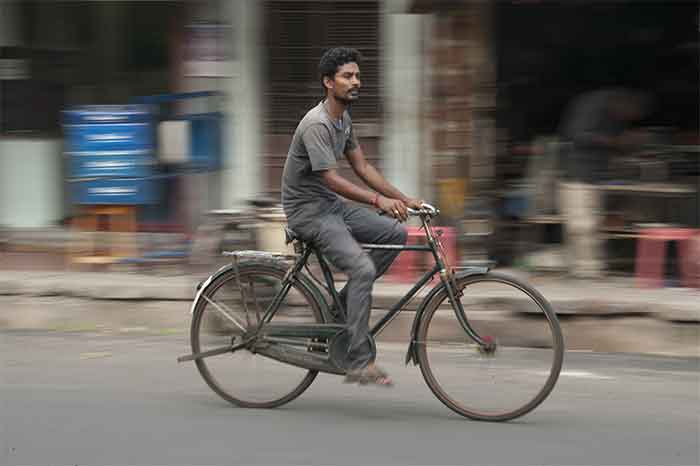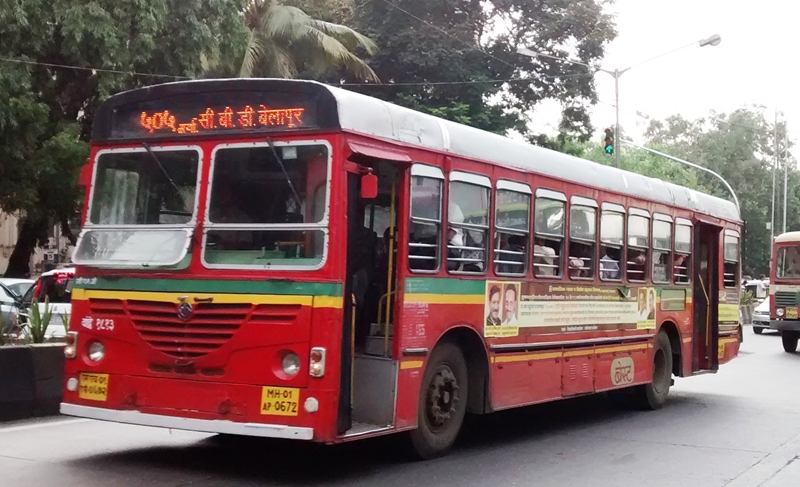
In recent years there is demand for bicycle lanes by a section of the bicycle community in India. It comes mainly from Metro cities and people who demand are also younger people who use fancy/professional bicycles and are members of various bicycle clubs. Ordinary people who use the standard/roadster/Bangla cycles do not appear to be part of this group and nor is there such a demand from smaller cities and towns. The ostensible reason given is the safety of the cyclist.
However in our opinion this demand stems from the car owner community who wants the road clear of pedestrians and cyclists so that they can drive ‘safely’ and fast. As a matter of fact few cyclists are injured due to accidents and most of the injuries and deaths occur to car drivers and car passengers. They are unsafe. A car driver is scared that in case of an accident he may be lynched by the people. For this reason they want pedestrians and cyclists off the road and they want footpath and bicycle lanes. In fact banning bicycles on 174 roads in Kolkata is part of the same pressure of the car community. Demanding bicycle lanes amounts to agreeing that cars have right of the way.
Empirically also the bicycle lanes appear impractical in India. I have seen many photographs of bicycle lanes in India which are not used as bicycle lanes. They are not continuous; they have pot holes, are used by motor cycles and scooters, and are being used for parking of cars and motor cycles, used by hawkers and so on. In a city like Kolkata, there is no space on major arterial roads. They are already being occupied by hawkers with permanent and semi permanent structures.
A car driver is a scared person and most of the time in bad humour. Everyone on the road is his enemy including other car drivers. Often he mutters constantly foul language cursing other drivers, pedestrians and cyclists. The people of car community are also irritated by footpaths being occupied by hawkers and they demand the demolition of their stalls.
However for the hawkers it is a question of livelihood. So in Kolkata they have been organising since 1950. Today the National Hawker Federation is spread over 28 states comprising of 1188 unions and supported by 11 central trade unions. While occasional demolitions do take place, by and large no government can touch them. Many hawkers are bicycle based. Some are tricycle based like ice cream vendors. In Bangalore there is a beautiful design of tricycle based vegetable vending transport. The bicycle ban in Kolkata primarily affects the working class who used the standard or roadster bicycles and it is their demand that the bicycle ban should be removed. In my opinion the cycle community should work with hawkers union sharing the demand for the abolition of the bicycle ban.
Today we are standing at the crossroads of history. Capitalism is going through a huge crisis and trying to restructure itself through going the path of the fourth industrial revolution of artificial intelligence, 3D printers for manufacturing, e-cars, cars without drivers, and so on. This path leads to ecological destruction, extreme climate events, human misery, chaos and collapse. The car is symbolic of this path.
On the other hand some people are trying for a world of equality and sustainability by simpler living, organic farming, smaller cities and bicycles. The bicycle is a symbol of this path.
The section of the cycling community who wants bicycle lanes also owns cars and scooters and wants the two to coexist. I am afraid this cannot succeed. You have to choose between car and bicycle – between collapse and survival!
Instead of demanding bicycle lanes we should occupy the roads!
In the light of this what should be the demand of the bicycle community. Here is a model charter of demands.
Charter of Demands
- Reduce or eliminate GST taxes on Standard Cycle costing below Rs. 5000/-. At present it is 12%.
- Facilitate loans for cycles.
- Provide Kiosks for bicycle repair shops on convenient spots as they are provided for leather workers.
- Provide cycle parking places in convenient spots. E.g. like railway stations, major bus stations and bus stops, cinema halls, shopping centres etc.
- Provide cycle tracks in all community sports areas.
- Promote cycles by providing cycles to school children, police men, post men, telephone and electricity departments. Also to any other services that need a lot of travelling in the city.
Our Slogans
Pedal More. Pollute Less
Cycle to Work
Occupy all Streets
Republic on Roads
T. Vijayendra (1943- ) was born in Mysore, grew in Indore and went to IIT Kharagpur to get a B. Tech. in Electronics (1966). After a year’s stint at the Saha Institute of Nuclear Physics, Kolkata, he got drawn into the whirlwind times of the late 60s. Since then, he has always been some kind of political-social activist. His brief for himself is the education of Left wing cadres and so he almost exclusively publishes in the Left wing journal Frontier, published from Kolkata. For the last nine years, he has been active in the field of ‘Peak Oil’ and is a founder member of Peak Oil India and Ecologise. Since 2015 he has been involved in Ecologise! Camps and in 2016 he initiated Ecologise Hyderabad. He divides his time between an organic farm at the foothills of Western Ghats, watching birds, writing fiction and Hyderabad. He has published a book dealing with resource depletions, three books of essays, two collections of short stories, a novella and an autobiography. Vijayendra has been a ‘dedicated’ cyclist all his life, meaning, he neither took a driving licence nor did he ever drive a fossil fuel based vehicle. Email: [email protected]













































